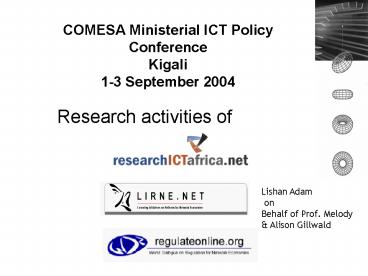COMESA Ministerial ICT Policy Conference Kigali 13 September 2004 - PowerPoint PPT Presentation
1 / 16
Title:
COMESA Ministerial ICT Policy Conference Kigali 13 September 2004
Description:
Lirne.net is the home of WDR a strategic collaboration between ... The Economics of Infrastructures Section, Delft University of Technology, The Netherlands; ... – PowerPoint PPT presentation
Number of Views:29
Avg rating:3.0/5.0
Title: COMESA Ministerial ICT Policy Conference Kigali 13 September 2004
1
COMESA Ministerial ICT Policy ConferenceKigali
1-3 September 2004
Research activities of
Lishan Adam on Behalf of Prof. Melody Alison
Gillwald
2
Why WDR?
21st Century economies require upgraded networks
to meet the requirements of the next generation
Internet services
The challenge
To sweep away obsolete regulations protecting
monopolies and restricting network access and to
establish new regulations that will provide a
foundation for information infrastructure
development From supply of network facilities to
stimulation of demand, from physical to human
capital, from restricted funding to diverse
sources
The role of WDR
WDR facilitates the transformation of regulation
through research and , international dialogue-
bringing partners
3
- Dialogue on Interactive Web Sites
- Discussion Papers
- Forum discussions among experts
- 2003/04 Stimulating Investment in Network
Development Role of Telecoms regulation - 2004/05 - Diversifying participation in network
development
4
WDR theme for 2004/5
Diversifying participation in network development
- In developing countries, traditional telecom
networks were funded by the state and donors - Private sector funding was primarily supplied to
mobile operators. - The result has been the slow development of
Internet services - Alternatives sources of investment are needed,
such as private/public partnerships - The range of possible sources of investment for
network development, the opportunities they
provide and the barriers they must overcome, have
not been comprehensively documented or
systematically examined - This is the role of the WDR theme for 2004/5
5
Why LIRNE.NET?
- Lirne.net is the home of WDR a strategic
collaboration between - The Center for Information and Communication
Technologies (CICT), Technical University of
Denmark - The Economics of Infrastructures Section, Delft
University of Technology, The Netherlands - The LINK Centre at the University of
Witwatersrand, Johannesburg, South Africa - The Media_at_Ise Programme at the London School of
Economics.
6
LIRNE.NET mission
- To facilitate ICT-related institutional reform
throughout the world - through research,
training, dialogue, policy and regulatory advice
and - To build human capital in this new area as the
foundation for effective policy, regulation,
governance, management and development in new
"network" or "knowledge" economies.
7
LIRNE.NET activities
- External Training Initiatives (for Government,
Industry and NGOs) - Research Activities and Reports
- Expert Analysis Commentary on Current Issues
- World Dialogue on Regulation for Network
Economies
8
Why Research ICT Africa!
There is a lack of information and analysis about
the ICT sector on the African continent. RIA!
aims to fill this gap with relevant research and
data
The challenge
To create network of African researchers that
will generate the information and analysis needed
to inform appropriate but visionary policy
formulation and effective regulation of ICTs
across Africa.
9
Network members
- LINK Centre, University of the Witwatersrand -
South Africa - Eduardo Mondlane University Mozambique
- Lagos Business School Nigeria
- Namibia Economic Policy Research Unit Namibia
- Summit Strategies Kenya
- University of Addis Ababa Ethiopia
- University of Botswana Botswana
- University of Dar es Salaam Tanzania
- University of Ghana Ghana
- University of Makerere Uganda
- University of Rwanda Rwanda
- University of Yaounde Cameroon
- University of Zambia - Zambia
10
The Telecom Sector Performance Reviews
Participating countries
- South Africa
- Uganda
- Zambia
- Cameroon
- Ethiopia
- Kenya
- Rwanda
11
Primary objective
Evaluating sector performance against policy
objectives
- Secondary objectives
- Addressing the real and current challenge of
feeding into policy review processes - Starting debate on the relevance of indicators
- Creating capacity in policy research on the
continent
12
(No Transcript)
13
Source ITU World Telecommunications Indicators
2003
14
The E-usage Access Index
- Evolved out of two baseline studies
- ICT sector performance reviews
- Fair Access to ICT Report
Most studies focus on the supply-side of the
equation, namely how the operators, regulators
and governments impact on users and consumers
15
The E-usage Access Index (cont.)
E-access Usage Index seeks to measure what is
happening in the ICT sector from the lens of
users, consumers and those marginalised from
services and to analyse access, demand and usage
patterns in response to services delivered as a
result of operators responses to policy and
regulatory frameworks.
16
The E-usage Access Index (cont.)
- Questions that must be answered are
- what factors impact on users and consumers of ICT
technologies? - How much are users and consumers prepared to
allocate to a basket of communication
technologies? - How do consumers access communications
technologies? - What strategies have the poor adopted to access
communications?































